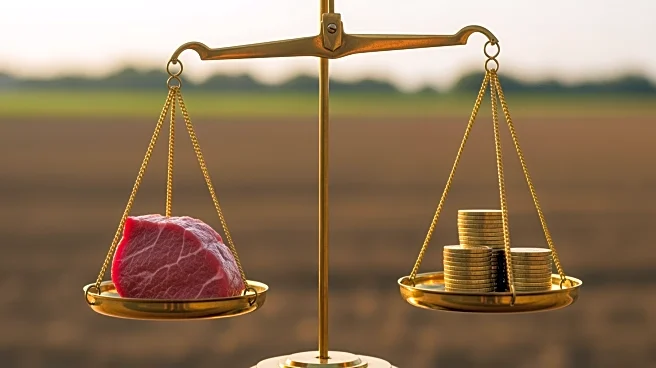What's Happening?
President Trump has imposed tariffs on beef imports from Brazil, Australia, New Zealand, and Uruguay, contributing to a significant rise in U.S. beef prices. The tariffs, which include a 50% rate on Brazilian
beef, have led to a decrease in imports from these countries, exacerbating the supply shortage in the U.S. This comes at a time when the U.S. cattle herd is at a 75-year low, further tightening the supply chain. The Bureau of Labor Statistics reported a year-over-year increase in beef prices between 12% and 18% for various uncooked beef products. The tariffs have also increased costs for feed, farm equipment, and machinery, adding financial pressure on U.S. cattlemen.
Why It's Important?
The rising beef prices have significant implications for U.S. consumers and the agricultural industry. With tariffs reducing imports, domestic supply struggles to meet demand, leading to higher prices for consumers. This situation affects the profitability of ranchers who face increased costs for feed and equipment due to tariffs on essential items like steel and aluminum. The political environment adds uncertainty, impacting ranchers' decisions on herd management. The National Cattlemen's Beef Association has expressed concerns over potential harm to rural America, highlighting the broader economic impact of these tariffs.
What's Next?
The U.S. may see continued pressure on beef prices as the cattle herd remains low and tariffs persist. Ranchers face challenges in rebuilding herds due to high costs and environmental factors like drought. The political landscape may influence future tariff policies, potentially affecting import dynamics and domestic supply. Stakeholders, including ranchers and consumer groups, may advocate for policy changes to alleviate the financial burden and stabilize beef prices.
Beyond the Headlines
The tariffs highlight the complex interplay between trade policies and domestic agriculture. They underscore the need for strategic planning in agricultural policy to balance trade relations and domestic supply needs. The situation also raises ethical considerations regarding the impact of political decisions on rural communities and food security.










